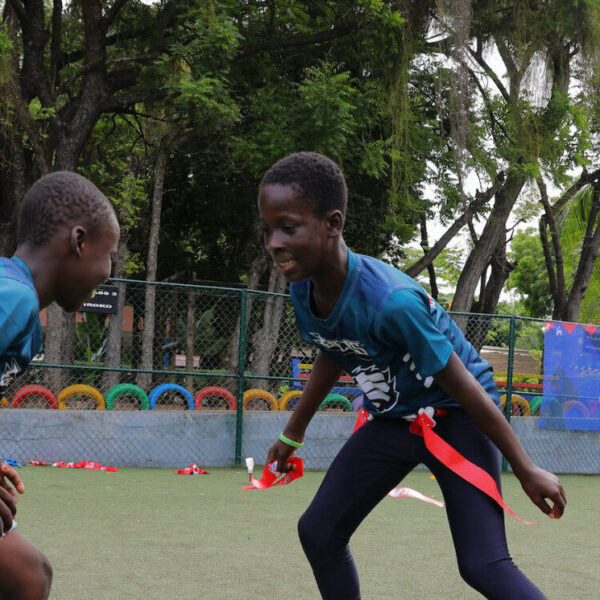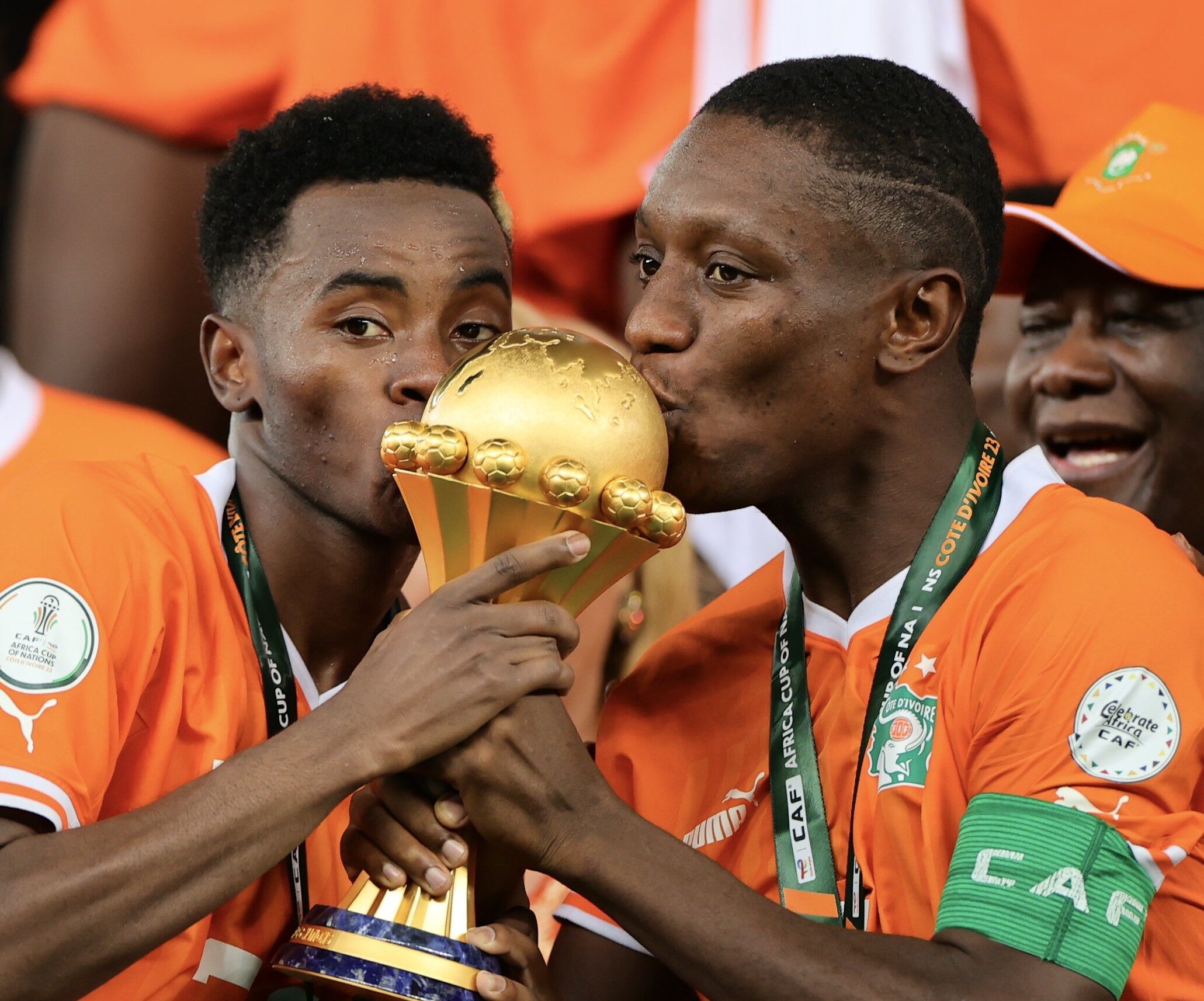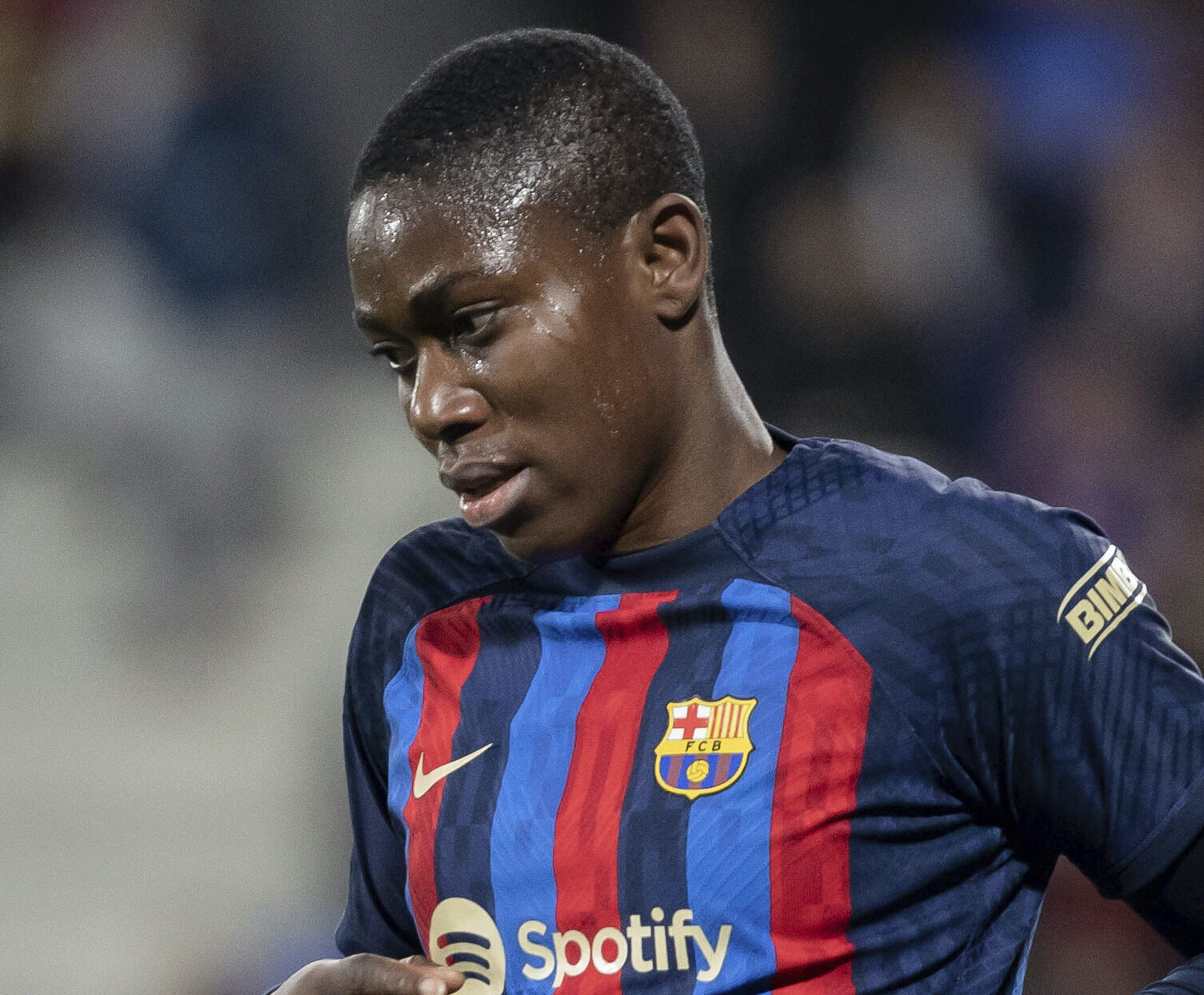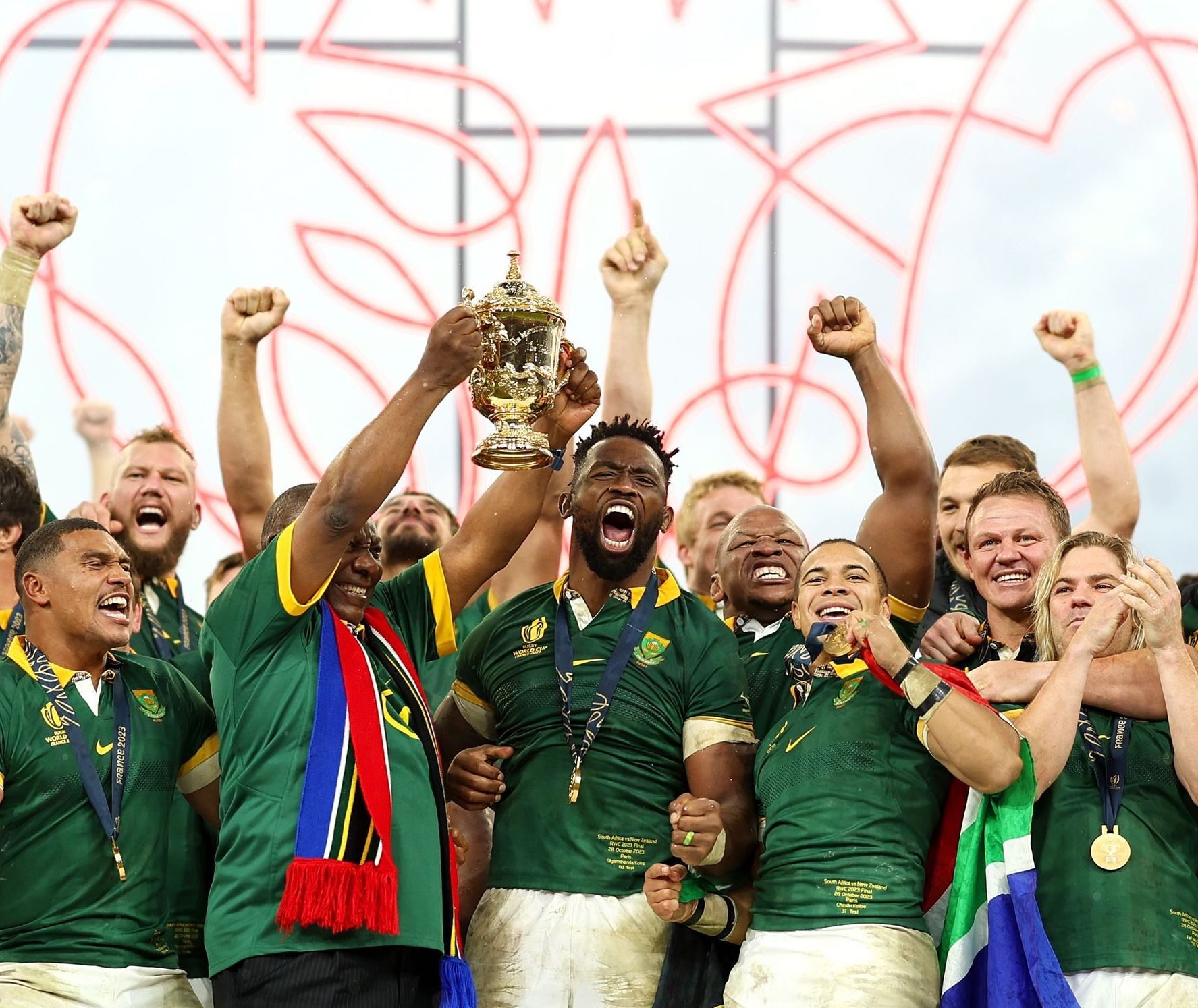
Photo credit: Emily Wirtz/NFL
Sports
The NFL Casts A Wide Net Across Africa

Photo credit: Emily Wirtz/NFL
By Kingsley Kobo
April 2024
In Africa, football is widely known as the sport played with a round leather ball using mostly the legs, between two goalposts, with a median line separating the opposing teams. In the United States, this sport is called soccer and not football, which is played mostly using the hands over an oval ball, with helmets, mouthguard, padded pants and shoulders protecting players from injuries.
It’s a rare discipline in Africa and needs introduction even to many sport fans. The sport that appears closest to American football in Africa is rugby. Rugby is not a dream sport to many youths and remains a dormant activity on most of the continent except in South Africa.
Soccer remains the king of sports in Africa. It opens doors, brings wealth and makes you a national hero. It is the utmost wish of most families to bear a talented boy, who can kick a soccer ball, and move it to a professional level.
Basketball has been gaining traction thanks to the NBA’s aggressive grooming programs across Africa. It boasts domestic leagues and local governing bodies in most countries like soccer. It is played in schools and on the streets. However, role models and success stories are still not abundant enough to spark a swoon.
The century-old National Football League (NFL) is finally taking a leaf out of NBA’s book by spreading the message about its beautiful sport to the world, in quest of talents, popularity and adoption. Africa has been one of the destinations, fortunately.
“Although it appears to be coming too late, I think NFL is taking a good step. American football ought to have been integrated in African sports culture two decades ago. Not everybody can play soccer. African youths have the strength, stamina, stature and height to succeed in the NFL, so what have we been waiting for,” Kenyan sports journalist of The Standard, Denis Onyango, tells STATEMENT.
“It could play a role as an alternative sport to soccer. Look at what is happening in Senegal. They have developed wrestling to the point that it attracts fans more than soccer and brings in lots of money. Senegalese wrestlers live in mansions, drive big cars and are cult heroes – the typical dreams of our sports-oriented youths.”
NFL threw caution to the wind and launched the International Pathways Program (IPP) in 2017 as a pilot program to help expand its player pool to the rest of the world. The IPP provides professional-level football training to youths, most of them novice in the sport.
The IPP Program made its way into Africa in 2022, with the setting up of a training camp in Ghana, officially known as NFL Africa Touchdown camp, which attracted hundreds of youths across the region.
“I heard about the program through a friend who is a taekwondo athlete. He told me that American football people are in town to pick players to the US. Hearing that I got motivated and decided to attend,” says 22-year-old Evans Gyebi, who works at the Tema seasport.
“I used to be an aspiring soccer player. I wanted to go to Europe to play professional football and help my family. I come from a poor background. My mum is a widow, catering for eight kids. However, two of my coaches told me I was too huge for soccer and that it would affect my pace and spontaneity. American football could be my thing. We had a good training period but I am still waiting for a call. I keep training with my people in Accra and studying the rules of the sport.”
Gyebi added that youths were coming to make enquiries everyday weather they were fit enough to play. “Is it for the sport or because of the rumours in town that NFL wants to take people to the US, I really can’t tell.”
Buoyed by its breakthrough in Ghana, the IPP Program expanded to Kenya and South Africa the following year (2023). The objectives remained the same: selling the sport, digging up new talents and honing raw skills, according to NFL’s lead ambassador in Africa, Osi Umenyiora.
The Two-time Super Bowl champion (XLII and XLVI) is upbeat about the future of American football in Africa. He is the best person to tell us following his experience so far through The Uprise program he co-founded in 2020 with fellow Nigerian and former basketball star Ejike Ugboaja. The Uprise is a recruiting program focused on discovering potential American football talents in Africa.
“The experience from the camps so far is encouraging. We see progress and keen interest from many youths across the regions we have camped in,” Umenyiora tells STATEMENT.
“We are not trying to catch up with the pace of soccer or basketball in Africa. We want to move at our own pace because many people still don’t know this sport. The first question to tackle is whether there are available and interested talents for NFL in Africa. I can confirm that they are abundant,” he says.
According to NFL, there are currently 127 African players in the league – born in Africa or children born to African immigrants. Although the number is still too few to serve as role models and sources of inspiration for local youths on the continent, Umenyiora believes the ongoing NFL efforts would change the narrative in few years.
“Our objective is to get enough young talents who can survive the league. Not everybody definitely but the successful ones becomes role models for other, and so the chain continues,” he says.
However, the journey could be long and difficult, says Jonathan Luhende, technical director at Tanzania ministry of sports, owing to the current sporting landscape in Africa.
“The problem I foresee for NFL’s push in Africa is simple. Beside the fact that the discipline is not popular, its adoption could be difficult and expensive. American football is not like soccer that can be played anywhere even at your backyard. It requires a special pitch, special kits and special instructors. Who is going to finance those?
“No sports ministry has a budget for that discipline in Africa. I have never heard of it. If the NFL’s sole objective is coming to Africa to pick talents and taking them back to the United States that could work but it could backfire if they don’t invest in the sport on the continent.”
Soccer consumes more than half of the budget of sports ministries in Africa, according to statistics, due to its popularity and adoption. It has become a significant political weapon for the authorities owing to the huge number of followers.
Track and field, basketball and other minor disciplines gulp the remainder of the budget. America football is almost unheard of. However, things could change if NFL goes aggressive by starting from the grassroots, according to Ambrose Ajayi, former adviser at Nigerian Sports Commission.
“Every successful mainstream sports began on the streets or in schools. That is where NFL needs to start from in Africa. They need to lobby hard to get football into school programs, with enticing incentives. Then take it to the streets. Invest in pitches and provide kits for kids to learn and play,” Ajayi says.
“That was how soccer succeeded. You cannot just come in, pick talents and go away. What about those behind? You need to build and nurture the culture of the sport so that it becomes part of the society,” he says.
Another obstacle the NFL programs could face in Africa is the concern of parents and guardians about injuries, according Richard Miezan, director of youth sports at the ministry of sports in Cote D’Ivoire. The sport is widely seen as dangerous in Africa.
“From my 35 years of experience in grass roots sports, I think parents are more concerned about the safety of their children in any type of sporting discipline they choose to practice. Many frown at rugby because they feel it’s too physical. American football is uncommon to their knowledge but those who know the sport have the same cold sentiment towards it as with rugby,” he says.
“Some few years back, we hosted a group of former NFL players – who included Africans and Americans. They wanted information on how to sell the sport to locals. We gave them our statistics. They promised to come back but never did. Personally, I am happy about the news that NFL is officially turning its focus to the world, with Africa included. It’s a very popular sport and Africa can’t be left out,” Miezan adds.
The NFL is growing its fan base, with nearly 18 million viewers per game this season. Almost 115 million people watched the Super Bowl LVII (February 2023) clash between Kansas City Chiefs and Philadelphia Eagles. While Super Bowl LVIII (February 2014) between Kansas City Chiefs and San Francisco 49ers broke the records, as the most-watched telecast of all time, reaching 123.7 million viewers, according to NFL.
“Imagine that! Africa can’t be left out of this. These are strong arguments that NFL officials could take with them to African authorities and lobby for the inclusion of American football in school and college programs,” Miezan said.
Is American football the most injury-prone sporting discipline in the world? A former South African rugby technical director, Pascal Monyane, sheds some light.
“I don’t think so. It’s almost the same case with rugby. Folks are scared because they see hefty players running and jamming each other. Soccer records more injuries per season than America football. Football players are even more protected than their soccer counterparts. So, the injury myth is unnecessary,” Monyane says.
“In soccer, almost every part of the body is engaged, which exposes them to hits and injuries. Your feet, head, chest, arms, chin, back, belly, etc. We have seen soccer players being hit in their private parts, needing surgical intervention.”
Regardless of the potential barriers, the IPP Program is expected to proceed with its activities in Africa, in the hope of unearthing suitable candidates for the league back in the United States. The successful ones could become future role models for aspiring African athletes.
After Ghana, Kenya and South Africa, NFL will host camp in Nigeria sometime this year, according to Umenyiora.
“The only way for us is moving forward until NFL finds its footing on the beautiful continent,” he says.


